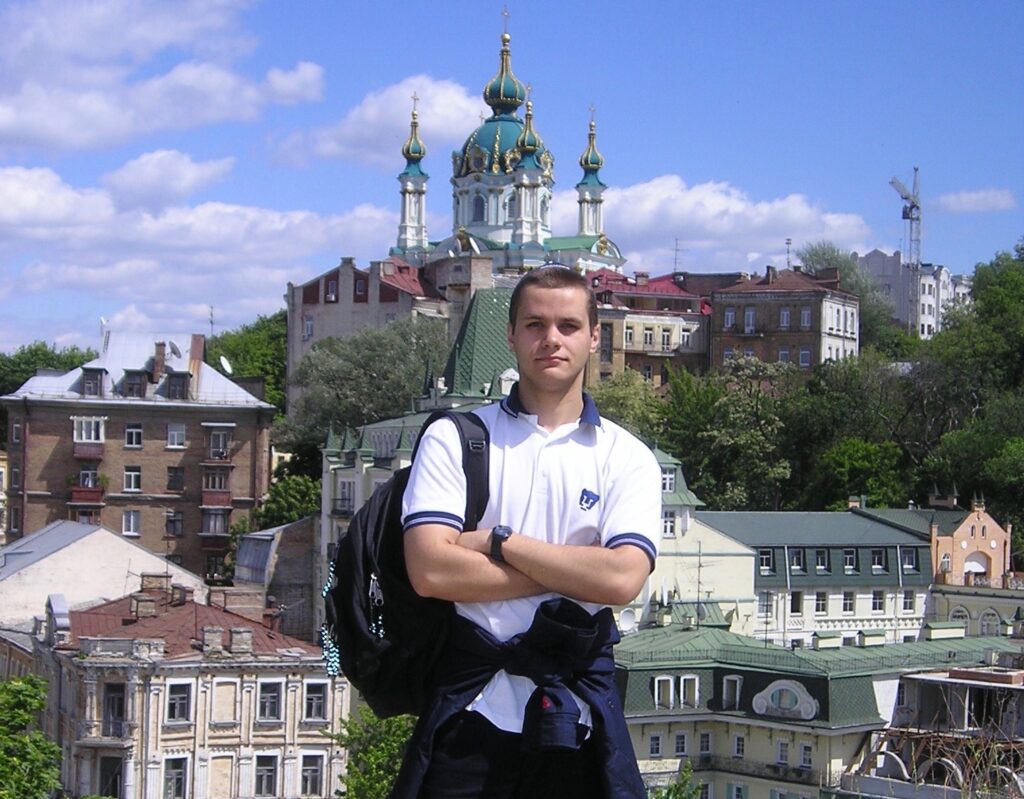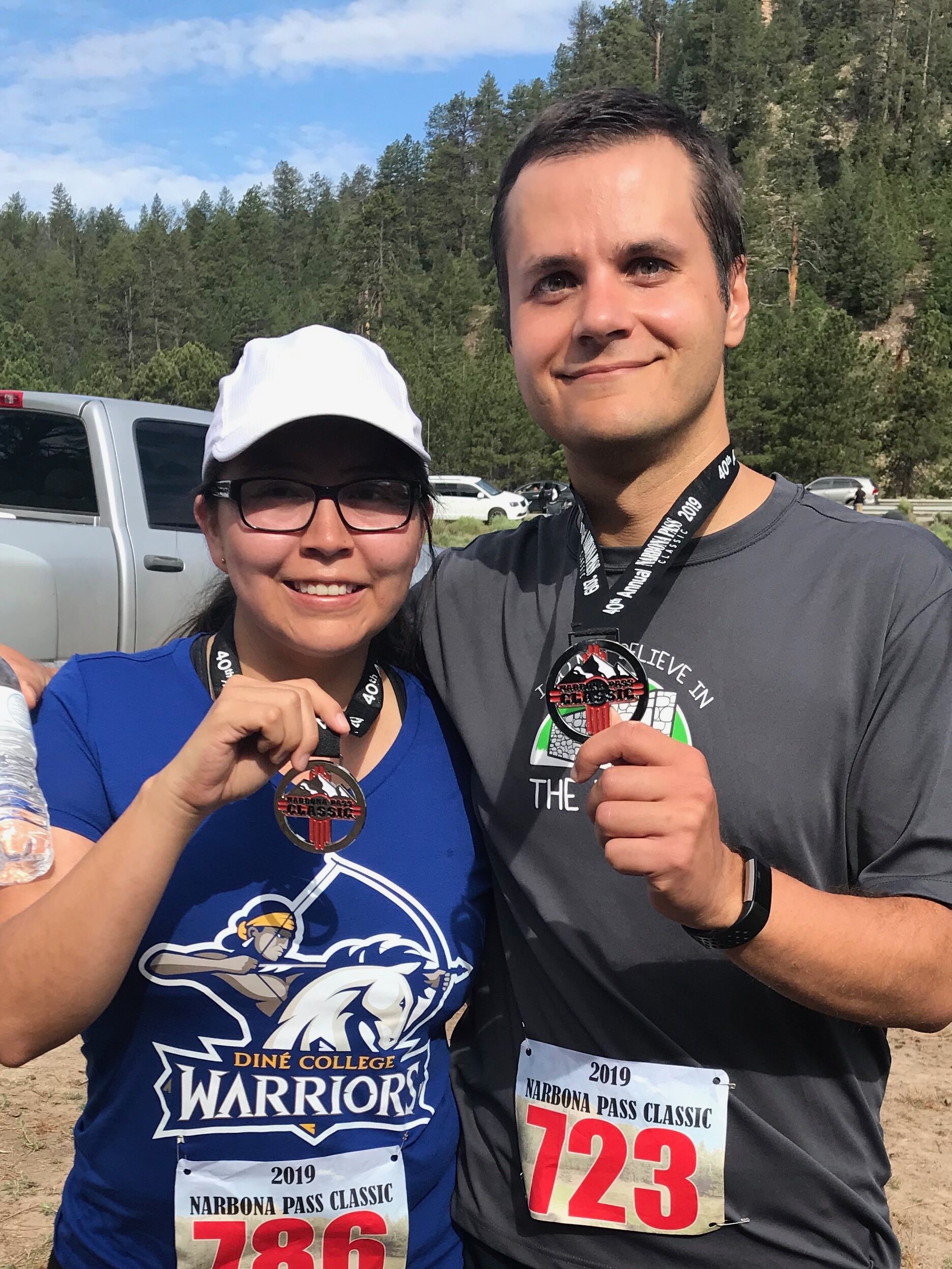Oleksandr Makeyev describes his path from Ukraine to the Navajo Nation, where he is now an associate professor in the School of STEM at Diné College. Along the way, he offers advice for those interested in teaching at a tribal college—and expresses hope for the future of his own homeland.
By Oleksandr Makeyev

My unlikely path to Diné College started in Kyiv, Ukraine (formally Kiev, USSR) where I was born, watched my country regain its independence following the collapse of the Soviet Union, and ultimately received my BS in mathematics and MS in statistics from Taras Shevchenko National University in 2003 and 2005. It was while working on my PhD in engineering science at Clarkson University in Potsdam, New York that I met my wife, Rhiannon Sorrell, who is Diné, born and raised on the Navajo Nation. After graduating simultaneously in the spring of 2010, we relocated to the University of Rhode Island where I pursued a postdoctoral fellowship in neural engineering while my wife completed two graduate degrees.
Back in Ukraine, my country continued to fight for its independence as Russia, in the years preceding the 2022 invasion, annexed land and worked to undermine its political system. This struggle to defend Ukrainian sovereignty is not new; a previous version of what is now the Russian Federation invaded Ukraine during the Ukrainian War of Independence of 1917-1922. That, too, was accompanied by senseless and brutal carnage on the part of the invader and, like today, it was resisted by the selfless heroism of Ukrainian defenders. All Ukrainians, for example, recall the 1918 Battle of Kruty, when several hundred cadets, though greatly outnumbered, fought a fierce battle against the Bolshevik army.
I long ago admitted to myself that I was not tough enough to go back and help my own people in Ukraine, but trying to help my in-laws was still possible, which is why in the fall of 2014 my wife and I took positions with Diné College, where I am currently an associate professor with the School of STEM and my wife is an assistant professor with the School of Arts, Humanities and English, as well as an instructional and digital services librarian. In the past eight years, my research program resulted in three awards from the National Science Foundation totaling $600,000, 11 papers in peer-reviewed journals with good impact factors, and three patents, including one issued and two pending.
I did not know nearly enough about the mission of tribal colleges and universities beforehand, and I am continuing to learn more and more about it every day. Still, based on my own challenges, and the challenges of my colleagues at Diné College and at other TCUs, I have identified a couple of basic recommendations that might help someone who is either considering or is about to join a TCU. These could be particularly helpful for those who have not worked at a tribal college or university before and do not know much about them.
First, do not wait for your TCU to use its very limited resources to get your research program off the ground. Many TCUs are not able to provide start-up packages for new faculty, but it does not mean that founding, stocking and staffing your research laboratory is impossible. External funding agencies may be able to help. For example, Small Grants for Research awards from the NSF Tribal Colleges and Universities Program are a particularly good fit since some of the costs related to setting up your laboratory would be considered as long as the proposed research project has sufficient merit and is a fit for the TCU context. These awards helped set up a number of successful research laboratories over the years, including mine.
The second recommendation is related to the fact that some faculty who join TCUs are tempted to contribute to improving too many different aspects of their institution’s educational, research and service processes at the same time. While undoubtedly well intentioned, it may lead to overwork, frustration with the slow pace of institutional change and, ultimately, burnout. Prioritize the life-work balance (with emphasis on the former) and self-care. In my humble opinion, you will not be able to do your best for your institution and the students unless you are at your best and can concentrate on what you are best at. This is more difficult than it sounds. You will be constantly approached with great ideas and new opportunities. You may be tempted to add just one more thing to your already busy schedule because you were invited or because, regrettably, working on constant overload has been normalized within under-resourced TCUs. Either way, the ability to stay focused on what you are already doing and to say a firm yet polite “no” to everything else is one of the most important skills you would need to hone to thrive at a TCU.

Working at a TCU may very well turn out to be the best and the most rewarding career move you will ever make. With a little luck and lots of perseverance you will get to do everything other universities have to offer, including cutting edge research. Moreover, you would have a really hard time finding better students and colleagues elsewhere. If in doubt, ask yourself these two simple questions: Is it important for you to make a significant difference and not just be a small cog in a large and well-oiled machine that will run every bit as smoothly without you? And, above all else, is it important for you to try improving access and quality of higher education for the most underprivileged and underrepresented population in the country that is also a source of greatly underestimated talent? If your answer to both questions is “yes” then congratulations and from the bottom of my heart I wish you all the best in your career at a TCU.
Even as I work to support the development of the Navajo Nation, seeing my wife’s concern for the future of her community, I cannot help being deeply concerned about the future of Ukraine, my homeland. All Ukrainians want is to live peacefully as an independent and sovereign nation–and no one can take it away from them. And if you are wondering, what can possibly stop Russia committing unimaginable atrocities in Ukraine yet again–atrocities that have already resulted in tens of thousands of casualties, including the death of over 360 Ukrainian children, and recently escalated to mutilating and mass executing Ukrainian prisoners of war–the answer is unwavering support of the world, and that support starts with every single one of us. My heartfelt gratitude goes to the people of the United States who chose to stand with Ukraine in this darkest of hours. I am not just talking about numerous US veterans who joined the International Legion of Territorial Defense of Ukraine, even though their courageous sacrifice humbles me beyond belief, but also about everyone who spared a small donation toward humanitarian aid, or contacted their senators and representatives urging them to support Ukraine, or raised public awareness of this ongoing massacre that will continue until Russia’s genocidal regime is soundly defeated.
Please, feel free to reach out to me for additional ideas on how to help.
• • •
Enjoyed this story? Enter your email to receive notifications.

A very well-written piece of thoughts Dr. Makeyev!
This is true that “working at a TCU may very well turn out to be the best and the most rewarding career move you will ever make. With a little luck and lots of perseverance, you will get to do everything other universities have to offer, including cutting-edge research.”
Also, sharing your skills with resource-limited communities not only improves your own learning but gives you a sense of satisfaction that is the ultimate treasure.